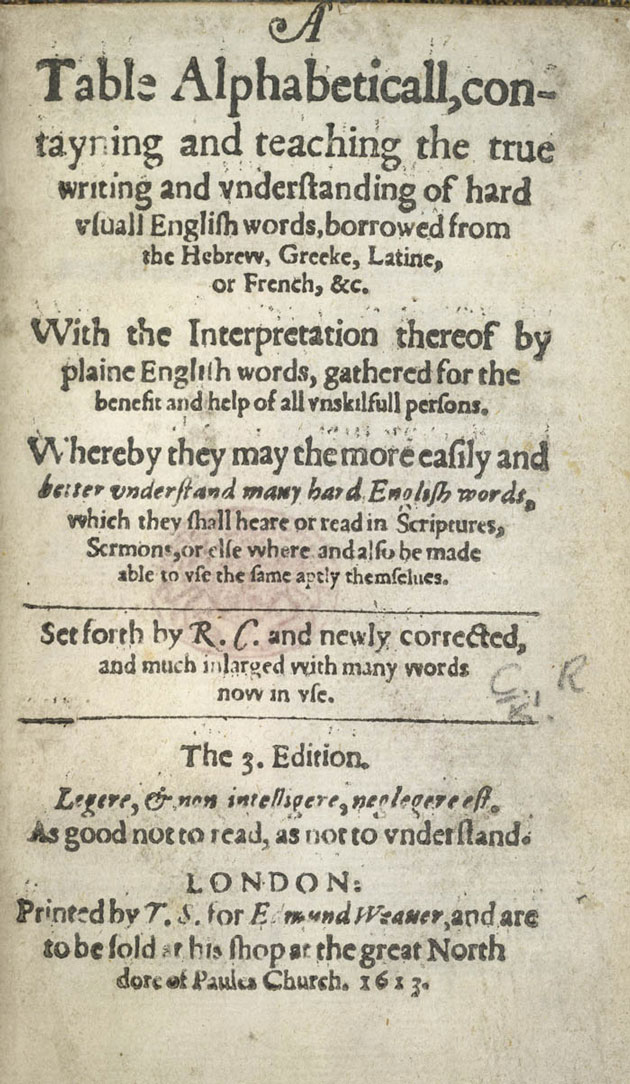|
An English Expositor
''An English Expositor: teaching the interpretation of the hardest words used in our language, with sundry explications, descriptions and discourses'' is a dictionary of hard words compiled by John Bullokar and first published in London in 1616. The book is significant as the second monolingual Monoglottism (Greek μόνος ''monos'', "alone, solitary", + γλῶττα , "tongue, language") or, more commonly, monolingualism or unilingualism, is the condition of being able to speak only a single language, as opposed to multilingualism. ... dictionary to be printed in the English language. Its aim, as laid out in the preface, was to catalogue the "great store of strange words" in the English language, and "open the signification of such words, to the capacitie of the ignorant". It was extensive in scope, covering not only foreign loanwords and words that had become obsolete, but also terms associated with science and philosophy. It contained twice as many entries as its sole p ... [...More Info...] [...Related Items...] OR: [Wikipedia] [Google] [Baidu] |
John Bullokar
John Bullokar (1574–1627) was an English physician and lexicographer. He was born in St Andrew's parish, Chichester, Sussex, and baptized there on 8 November 1574, third of four known children of Elizabeth and William Bullokar. Staunch Roman Catholics, the William Bullokar family was forced to move and was excommunicated on several occasions. The second son, Thomas Bullokar (also known as John Baptist Martyr) became a Franciscan and, in 1642, was hanged, drawn, and quartered at Tyburn for celebrating mass. John Bullokar, presumably because of his religion, obtained his medical degree away from England, at Caen, France, on 16 October 1612. John Bullokar was the author of " An English Expositor: Teaching the Interpretation of the Hardest Words Used in our Language" (1616) and "A True Description of the Passion of our Saviour Jesus Christ, a poem in six-line stanzas" (1622). For his contribution to the development of the English dictionary, John Bullokar is recognized by ling ... [...More Info...] [...Related Items...] OR: [Wikipedia] [Google] [Baidu] |
Monolingual
Monoglottism (Greek μόνος ''monos'', "alone, solitary", + γλῶττα , "tongue, language") or, more commonly, monolingualism or unilingualism, is the condition of being able to speak only a single language, as opposed to multilingualism. In a different context, "unilingualism" may refer to a language policy which enforces an official or national language over others. Being monolingual or unilingual is also said of a text, dictionary, or conversation written or conducted in only one language, and of an entity in which a single language is either used or officially recognized (in particular when being compared with bilingual or multilingual entities or in the presence of individuals speaking different languages). Note that mono''glottism'' can only refer to lacking the ''ability'' to speak several languages. Multilingual speakers outnumber monolingual speakers in the world's population. Suzzane Romaine pointed out, in her 1995 book ''Bilingualism'', that it would be weird ... [...More Info...] [...Related Items...] OR: [Wikipedia] [Google] [Baidu] |
A Table Alphabeticall
''A Table Alphabeticall'' is the abbreviated title of the first monolingual dictionary in the English language, created by Robert Cawdrey and first published in London in 1604. Although the work is important in being the first collection of its kind, it was never deemed a particularly useful work. At only 120 pages, it listed a total of 2,543 words accompanied by very brief (often single-word) definitions. In most cases, it was little more than a list of synonyms. The words chosen by Cawdrey were quite arbitrary and often obscure. The dictionary's claimed purpose was "for the benefit and helpe of ladies, gentlewomen, or other unskillful persons". Within a few decades, many other English dictionaries followed. Details The full title of ''A Table Alphabeticall'' is ''"A table alphabeticall, conteyning and teaching the true writing, and vnderſtanding of hard uſuall Engliſh words, borrowed from the Hebrew, Greeke, Latine, or French, &c. With the interpretation thereof by plaine ... [...More Info...] [...Related Items...] OR: [Wikipedia] [Google] [Baidu] |
English Dictionaries
English usually refers to: * English language * English people English may also refer to: Peoples, culture, and language * ''English'', an adjective for something of, from, or related to England ** English national identity, an identity and common culture ** English language in England, a variant of the English language spoken in England * English languages (other) * English studies, the study of English language and literature * ''English'', an Amish term for non-Amish, regardless of ethnicity Individuals * English (surname), a list of notable people with the surname ''English'' * People with the given name ** English McConnell (1882–1928), Irish footballer ** English Fisher (1928–2011), American boxing coach ** English Gardner (b. 1992), American track and field sprinter Places United States * English, Indiana, a town * English, Kentucky, an unincorporated community * English, Brazoria County, Texas, an unincorporated community * Engli ... [...More Info...] [...Related Items...] OR: [Wikipedia] [Google] [Baidu] |
